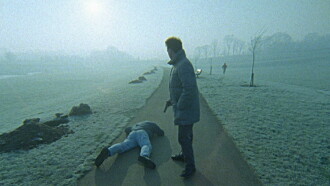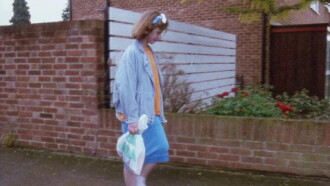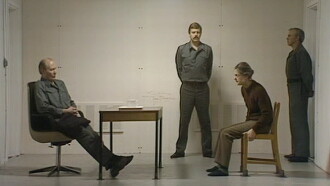
Alan Clarke Trailers
Alan Clarke: Out of His Own Light TrailerDirector: Alan Clarke TrailerBukovsky Trailer
Alan Clarke (28 October 1935 – 24 July 1990) was a television and film director, producer and writer, born in Wallasey, Merseyside, England.
Most of Clarke's output was for television rather than cinema, including work for the famous play strands The Wednesday Play and Play for Today. His subject matter tended towards social realism, especially with respect to deprived or oppressed communities.
As Dave Rolinson's book (see 'Further reading', below) on Clarke details, between 1962 and 1966 Clarke directed several plays at The Questors Theatre in Ealing, London. Between 1967 and 1969 he directed various ITV productions including plays by Alun Owen (Shelter, George’s Room, Stella, Thief, Gareth), Edna O’Brien (Which Of These Two Ladies Is He Married To? and Nothing’s Ever Over) and Roy Minton (The Gentleman Caller, Goodnight Albert, Stand By Your Screen). He also worked on the series The Informer, The Gold Robbers and A Man Of Our Times (but not, as Sight and Sound once claimed, Big Breadwinner Hog). Clarke continued to work for ITV through the 1970s but now made much of his work for the BBC. This included pieces for The Wednesday Play (Sovereign's Company 1970), Play for Today and Play of the Month. Distinctive work for these strands included further plays by Minton including Funny Farm (1975) and Scum (further details below), but also Sovereign’s Company (1970) by Don Shaw, The Hallelujah Handshake (1970) by Colin Welland and Penda’s Fen (1974) by David Rudkin. He also made To Encourage the Others (1972), a powerful drama documentary about the Derek Bentley case, and several documentaries, including Vodka Cola (1981) on multinational corporations.
A number of his works achieved notoriety and widespread criticism from the conservative end of the political spectrum, including Scum (1977), dealing with the subject of borstals (youth prisons), which was banned by the BBC, and subsequently remade by Clarke as a feature film in 1979 (the original television version was eventually screened after his death). His 1982 television play Made in Britain, starring Tim Roth (in his television debut) as a racist skinhead and his negative relationship with authorities and racial minorities, was based on a screenplay by David Leland. He directed the feature film Rita, Sue and Bob Too released in 1987.
Clarke's work in the 1980s is fiercely stark and political, including the David Leland plays Beloved Enemy (1981) on multinational corporations and Psy-Warriors (1981) on military interrogation. But he also directed David Bowie in Baal (1982) for the BBC, part of Clarke’s interest in Bertolt Brecht. His film work became more sparse, culminating in Contact (1984) on the British military presence in Northern Ireland, Billy the Kid and the Green Baize Vampire (1985), Road (1987) and his short film (40 mins.) Elephant (1989) which dealt with 'the troubles' in Northern Ireland and featured a series of shootings with no narrative and hardly any dialogue; all were based on accounts of actual sectarian killings that had taken place in Belfast. The film took its title from Bernard MacLaverty's description of the troubles as "the elephant in our living room" - a reference to the collective denial of the underlying social problems of Northern Ireland. His final production, The Firm (1989), covered football hooliganism through the lead character played by Gary Oldman, but also the politics of Thatcher’s Britain.
Clarke inspired a generation of actors, writers and directors, including Paul Greengrass, Stephen Frears, Tim Roth, Ray Winstone, Gary Oldman, Danny Brocklehurst and Iain MacDonald. Filmmaker Harmony Korine has cited Clarke as a major influence on his work.
Clarke's son is Gabriel Clarke, an award-winning sports journalist with ITV.

Most Popular Alan Clarke Trailers
Total trailers found: 59
25 January 1989
This short film, first broadcast on BBC TWO in 1989, is a chilling depiction of a series of violent killings during the Troubles in Northern Ireland.
23 September 1987
Christine is a pasty-faced teen in a windbreaker and ill-fitting striped shirt who walks endlessly from one friend's house to another, delivering heroin while their parents are absent.
10 July 1983
After being sent to a detention centre, a teenage skinhead clashes with the social workers who want to conform him to the status quo.
08 November 1977
A hard and shocking story of life in a British borstal for young offenders.
20 May 1987
Rita and Sue are two teenagers living on a run-down council estate in Bradford, who both share a job babysitting for Bob and Michelle's children.
06 January 1985
A platoon of British paratroopers on border patrol in South Armagh face a series of tense encounters.
01 January 1977
Alan Clarke's documentary about Soviet writer and dissident Vladimir Bukovsky, who had left the Soviet Union in 1976 after years spent in their prisons and psychiatric wards.
25 November 1985
Cocky cockney snooker player Billy Kid accepts the challenge of a grudge match from Maxwell Randall (the Green Baize Vampire), six times world champion; the loser will never play professional snooker again.
12 July 1991
Documentary - Alan Clarke's films exposed a real, raw world as no other films have. Works such as "Scum," "Made in Britain," "The Firm," "Rita, Sue and Bob Too" and "Elephant" inspired a generation of British actors, writers and directors that changed cinema forever.
02 February 1982
Baal is an amoral poetic genius who, after a life of debauchery, betrayal and violence, is about to cut his ties to the world and meet his doom.
17 October 1978
Play for Today about Russian dissidents.
03 May 1976
Jimmy is a talented young boxer. Every punch he throws is eagerly watched by his trainer, and resented by his girlfriend.
08 March 1969
A film by Alan Clarke for the 'Sunday Night Theatre' anthology series.
18 March 1973
A professional footballer suffers an injury which could jeopardise his career.
16 September 1973
A BBC television adaptation of Aleksandr Solzhenitsyn's novel. The prisoner Nemov is an honest man serving a term of 10 years for violations of Article 58.
21 March 1974
Through a series of real and imagined encounters with angels, demons, and England's pagan past, a pastor's son begins to question his religion and politics, and comes to terms with his sexuality.
28 November 1972
Alan Clarke's standalone film first appeared as an episode of the BBC series "The Edwardians" and concerns notorious bon vivant, swindler, MP, public speaker, founder of the Financial Times and publisher of John Bull magazine, Horatio Bottomley.
09 July 1975
Teenager Diane Weaver lives in a small council flat with her brooding father, the groundskeeper of a local church.
17 July 1981
Soldiers are captured and interrogated by terrorists: but is it real or only a sadistic form of psychological training exercise?
08 December 1968
A film by Alan Clarke for the 'The Company of Five' anthology series.
21 April 1970
Sovereign's Company is the story of a boy from an army family with a long tradition of honour and distinction, who goes to a military academy as an officer cadet and finds himself temperamentally unsuited to the life.
19 November 1970
When it's time to wet the baby's head, it's surprising the secrets that emerge...
30 September 1967
A man is interviewed by a young widow as a potential lodger, and learns some disturbing facts about the woman's relationship with her dead husband.
19 May 1967
A woman seeks shelter from the rain in a park conservatory but is forced into conversation with a man who wants to know what else she is sheltering from.
12 September 1979
Powerful, uncompromising drama about two boys' struggle for survival in the nightmare world of Britain's notorious Borstal Reformatory.
06 February 1968
Albert lives with his Grandma, who he thinks is cramping his style. However an incident reveals to him that he is as much dependent on her as she is of him.
10 February 1981
A cool hard study of 'the art of the deal' on a global scale. Sir Peter, the chillingly affable chief exec of big British multi-national UKM, learns that the Soviet Union's chief scientists are in London with government credit to spend.
04 July 1974
Harry and Emily are two of the livelier residents of a London old people's home. When they decide to get married, things prove less simple.
16 October 1972
Johnson begins his life sentence for the murder of a policeman. It is not long before he will experience the harsh realities of the brutality and day to day drudgery of prison life.
17 December 1970
Henry sets out to join a church and passionately help the parish. Slowly but surely his habits of exaggeration and lying begin to catch up with him.
27 February 1975
Funny Farm depicts a night shift by nurse Alan Welbeck (Tim Preece) on a psychiatric ward.
19 March 1972
The story concerns Susie, a transgender bartender, dealing with four patrons who stumble into her place of work.
26 February 1989
A seemingly respectable estate agent leads a double life as the head of a vicious, well-organised gang of football hooligans.
19 June 1968
Stella escapes an unhappy relationship to live in a bedsit. She meets another man which forces her to make decisions about her life.
24 July 1968
A lady catches the attention of a compulsive gambler.
03 June 1971
Comedy play about a seaside photographer, Henry Hunter, who goes to Margate every year to work, staying with his friends Frank and Hylda.
23 April 1978
Danton's Death is arguably the most dramatic and penetrating study of revolution ever written. Georg Büchner concentrates on that moment in 1794 when the Reign of Terror, already well established, spills over into a total blood-bath.
29 November 1969
The story of a comedian with a talent close to genius but with an insecurity problem.
01 January 1984
Documentary about the work of South African intelligence agencies in Britain, with an interview with Information Secretary in the South African government, Eschel Rhoodie, and former agents.
03 July 1968
Mavie cannot declare her love, because the object of her affections is a very busy man.
18 January 1968
A film by Alan Clarke for the 'A Man of Our Times' anthology series.
22 July 1980
Documentary on the relationship of the Eastern and Western countries of the world characterised by Charles Levinson as the Vodka Bloc and the Cola Front, which have been stimulated into further consolidation by the Afghanistan invasion.
01 January 1983
An analysis of short consultations, concentrating on five U.K. surgeries, intended for small groups of GPs, vocational trainees or continuing medical education groups.
17 July 1968
An intense court case involving divorce proceedings is adjourned for lunch. Husband and wife then discover they are both going to be eating in the same cafeteria.
19 March 1973
Max Glanville, a judge whose attention wanders throughout a trial for criminal assault, makes an error in the sentence - which he has to correct.
15 December 1968
A film by Alan Clarke for the 'The Company of Five' anthology series.
23 May 1967
A middle aged man taunted by his young office colleagues about his bachelorhood turns to violence.
07 October 1987
A view of the inhabitants of a derelict road in Manchester, unsatisfied with their lives and routines.
16 June 1967
Visiting unemployed brothers Clack and Ged, social security inspector Mr. Hicks finds few reasons for sympathy.
14 March 1968
Rejected now by both family and friends, Max has only three weeks left in which to find a solution to his problems.
04 December 1984
Video-shot on studio sets, Stars of the Roller State Disco borders on science fiction of the dystopian variety.
27 March 1972
The true story of Derek Bentley, whose conviction and execution for a murder committed by someone else provoked a public revulsion.
01 October 1969
A young train spotter heads to Staffordshire for a historic journey through a soon to be condemned tunnel.
21 March 1972
Set in Yorkshire, diabetic Horace has learning disabilities and works in the back of a joke shop. He befriends loner schoolboy, Gordon Blackett who retreats from his loveless home into an imaginary world.
13 June 2016
A multi-part documentary about Alan Clarke, featuring interviews with various actors, writers and producers.





























